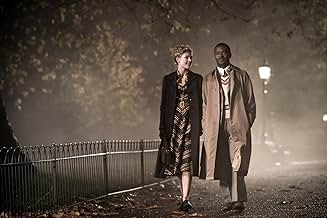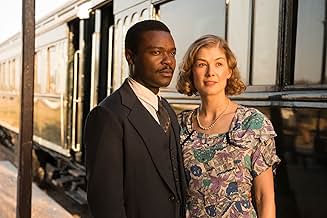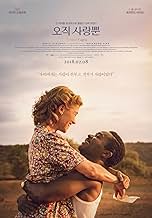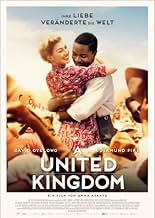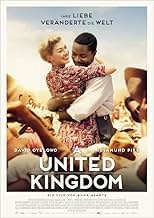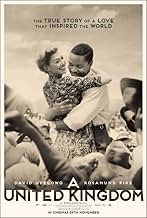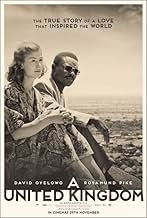VALUTAZIONE IMDb
6,9/10
17.413
LA TUA VALUTAZIONE
La storia del re Seretse Khama del Botswana e di come il suo matrimonio d'amore e controverso con una donna bianca britannica, Ruth Williams, portò il suo regno a fermenti politici e diploma... Leggi tuttoLa storia del re Seretse Khama del Botswana e di come il suo matrimonio d'amore e controverso con una donna bianca britannica, Ruth Williams, portò il suo regno a fermenti politici e diplomatici.La storia del re Seretse Khama del Botswana e di come il suo matrimonio d'amore e controverso con una donna bianca britannica, Ruth Williams, portò il suo regno a fermenti politici e diplomatici.
- Premi
- 6 vittorie e 5 candidature totali
Recensioni in evidenza
10pyor66
I lived in Botswana for twenty-five odd years and enjoyed every single moment of it, almost certainly due in large measure to Seretse's enlightened politics and the genuine and natural warmth of the Botswana people. I knew both main characters quite well. Seretse was a very approachable man, even as president, and it was a pleasure to spend some time in his company. He was a man well loved by everyone, black and white. In fact, in Botswana one scarcely thought in those terms. As a politician he had huge charisma and was a great orator. He was also a born leader. I remember well being told by insiders that government Ministers who were in trouble for minor abuse of office or the like, would tremble in fear outside his office when they were to be 'carpeted'.
Ruth was an extraordinarily capable woman and even in her later years had more stamina than almost anyone I have known. She was at work in her office in Gaborone from early morning to the end of the day, patron of the Red Cross, Botswana Council of Women etc etc. Contrary, however, to one reviewer's criticism, Rosalind Pike's portrayal was quite accurate. She was not a strident campaigner but a very effective mover who enjoyed a social life and had many friends. In her widowhood she received constant visits from senior members of the tribe and government and was widely loved and respected by her people. She was most certainly "Mohumagadi" - Mother of the Nation.
This film portrays their personalities pretty accurately and the characterisation of the actors is extraordinarily true to life. Both David Oyelowo and Rosamund Pike were absolutely convincing. The quality of the acting very quickly overcame my initial niggling concern that the physical likenesses were not quite there. The photography of Botswana was outstanding and the familiar views of Serowe from the Palapye 'road' and the scenes in the kgotla were quite emotional for me; I unexpectedly found I had a lump in my throat.
I can understand that, for others, the film may not have the immediacy it has for me, perhaps, but previous criticisms of 'cold' and 'unemotional' - No! Leaving aside my personal interest, it deserved to be the opener for the London Film Festival. Maybe not a total "blockbuster" but an unusual and great film nonetheless. Very close to fact.
Ruth was an extraordinarily capable woman and even in her later years had more stamina than almost anyone I have known. She was at work in her office in Gaborone from early morning to the end of the day, patron of the Red Cross, Botswana Council of Women etc etc. Contrary, however, to one reviewer's criticism, Rosalind Pike's portrayal was quite accurate. She was not a strident campaigner but a very effective mover who enjoyed a social life and had many friends. In her widowhood she received constant visits from senior members of the tribe and government and was widely loved and respected by her people. She was most certainly "Mohumagadi" - Mother of the Nation.
This film portrays their personalities pretty accurately and the characterisation of the actors is extraordinarily true to life. Both David Oyelowo and Rosamund Pike were absolutely convincing. The quality of the acting very quickly overcame my initial niggling concern that the physical likenesses were not quite there. The photography of Botswana was outstanding and the familiar views of Serowe from the Palapye 'road' and the scenes in the kgotla were quite emotional for me; I unexpectedly found I had a lump in my throat.
I can understand that, for others, the film may not have the immediacy it has for me, perhaps, but previous criticisms of 'cold' and 'unemotional' - No! Leaving aside my personal interest, it deserved to be the opener for the London Film Festival. Maybe not a total "blockbuster" but an unusual and great film nonetheless. Very close to fact.
"A United Kingdom" is based on the true-life relationship between Sir Seretse Khama, an African chieftain from what was then the Bechuanaland Protectorate, and a white British woman, Ruth Williams. The film implies that he was the King of Bechuanaland, but in fact no single individual ever held this position; Khama was the ruler of the Bangwatho, one of a number of tribes making up the Tswana nation, the largest ethnic group in the country. In Botswana, as Bechuanaland is now known, Khama and Ruth are today revered figures, as he was the leader of the country's independence movement and its first President when independence was achieved in 1966; unlike most other former colonies in Africa Botswana has remained a democracy ever since, and their son is the current President.
Khama's marriage to Ruth Williams (they met while he was studying in London in 1948) was highly controversial at the time. Many of Khama's own people, led by his uncle, refused to accept Ruth as their Queen. The South African government, which was just starting to introduce its policy of apartheid, objected furiously to the idea of a high-profile black leader in a neighbouring country marrying a white woman. Clement Attlee's Labour government, anxious to placate the South Africans who were threatening to leave the Commonwealth, intervened, exiling Khama from Bechuanaland and forbidding him to return. Winston Churchill, at the time leader of the Opposition, initially made sympathetic noises, but after the Conservatives were returned to power in 1951 he took an even harder line than Attlee. The situation was complicated by the discovery of diamonds in the territory; the British government, using the rift between Khama and his uncle as a pretext, threatened to revoke Bechuanaland's status as a Protectorate and declare it a Crown Colony. (The real reason was that in a Protectorate mineral rights belonged to the local people, whereas in a colony they belonged to the colonial power). One of Khama's few British allies was the Labour MP Tony Benn.
The action switches between an austere, drab post-war Britain and a bright sunlit Africa. The recreation of historical detail is well done and both the leading actors, David Oyelowo as Khama and Rosamund Pike as Ruth, are excellent. The film is an interesting look at a historical romance which made the headlines at the time but which today is largely forgotten, at least in Britain. 7/10
Some goofs. We hear a radio broadcast on the eve of Indian independence in 1947 telling us that Indians would go to bed "subjects of the Queen". Britain still had a King, George VI, in 1947. We are told that Queen Victoria made Bechuanaland a Protectorate to protect its people from "racist South Africa", but the Protectorate was created in 1885, twenty-five years before South Africa came into existence as a single nation. (In 1885 it was still a patchwork of British colonies and Boer republics). Prime Minister Attlee claims that the Presidents of South Africa, South-West Africa and the two Rhodesias were all opposed to Khama's marriage to Ruth. During Attlee's term of office (1945-51) none of these territories had a President.
Khama's marriage to Ruth Williams (they met while he was studying in London in 1948) was highly controversial at the time. Many of Khama's own people, led by his uncle, refused to accept Ruth as their Queen. The South African government, which was just starting to introduce its policy of apartheid, objected furiously to the idea of a high-profile black leader in a neighbouring country marrying a white woman. Clement Attlee's Labour government, anxious to placate the South Africans who were threatening to leave the Commonwealth, intervened, exiling Khama from Bechuanaland and forbidding him to return. Winston Churchill, at the time leader of the Opposition, initially made sympathetic noises, but after the Conservatives were returned to power in 1951 he took an even harder line than Attlee. The situation was complicated by the discovery of diamonds in the territory; the British government, using the rift between Khama and his uncle as a pretext, threatened to revoke Bechuanaland's status as a Protectorate and declare it a Crown Colony. (The real reason was that in a Protectorate mineral rights belonged to the local people, whereas in a colony they belonged to the colonial power). One of Khama's few British allies was the Labour MP Tony Benn.
The action switches between an austere, drab post-war Britain and a bright sunlit Africa. The recreation of historical detail is well done and both the leading actors, David Oyelowo as Khama and Rosamund Pike as Ruth, are excellent. The film is an interesting look at a historical romance which made the headlines at the time but which today is largely forgotten, at least in Britain. 7/10
Some goofs. We hear a radio broadcast on the eve of Indian independence in 1947 telling us that Indians would go to bed "subjects of the Queen". Britain still had a King, George VI, in 1947. We are told that Queen Victoria made Bechuanaland a Protectorate to protect its people from "racist South Africa", but the Protectorate was created in 1885, twenty-five years before South Africa came into existence as a single nation. (In 1885 it was still a patchwork of British colonies and Boer republics). Prime Minister Attlee claims that the Presidents of South Africa, South-West Africa and the two Rhodesias were all opposed to Khama's marriage to Ruth. During Attlee's term of office (1945-51) none of these territories had a President.
6.8 does not do justice to a film that tells a story of how love can overcome boundaries. In this case, this is one of the rare African stories that we tend to get to hear about. For a long time, stories to do with Africa have been about disease, poverty and undernourishment. Asante's take on this film does indeed tell the viewer that there is more to Africa than what meets the eye.
I believe that this film should set a precedent for more African stories to be told . This film tells you that there is a lot more than just about Mandela. There is need to learn about other Africans namely Jomo Kenyatta, Hastings Kamuzu Banda, John Chilembwe and many others. These are perhaps some of the few names that I can think of. I commend Asante for taking a bold stand in producing a film of a figure(s) that most people out there may have not heard.
For those of you that may want to get a different side to Africa, I would recommend that you begin by watching "A United Kingdom". In my view, it is one of the more decent films of 2016/17 combined.
I believe that this film should set a precedent for more African stories to be told . This film tells you that there is a lot more than just about Mandela. There is need to learn about other Africans namely Jomo Kenyatta, Hastings Kamuzu Banda, John Chilembwe and many others. These are perhaps some of the few names that I can think of. I commend Asante for taking a bold stand in producing a film of a figure(s) that most people out there may have not heard.
For those of you that may want to get a different side to Africa, I would recommend that you begin by watching "A United Kingdom". In my view, it is one of the more decent films of 2016/17 combined.
This is one of those movies that is flying under the radar and deserves to be seen. It is a wonderful story, well scripted, well acted, and has terrific cinematography. The fact that is a true story makes one wonder what the hell we have been learning in school when we have never been taught this type of history. I give this a ten and really it deserves it. It is a shame people have degraded the rating for some reason other than the fact that this is good cinema. It is a very deserving movie and is like the movie Hidden Figures or Queen Katwe, it is important for history. I am a white conservative and think everyone should see the movie.
This is an outstanding film about a story I knew nothing about. However, my review is more a review of IMDb and its voting system.
I note that this film has, at the time of writing twenty-two 1 star reviews. Maybe these are genuine but I suspect they are not. For one thing the film has not had many screenings so have as many as twenty-two different people really hated it that much?
Secondly, 1 star films do not get selected for the Toronto Film Festival or for the opening night film for the London Film Festival. The programmers and selectors of these highly regarded festivals are at the top of their game and each year they are offered several thousand films. None of them are going to risk their hard fought reputations on selecting a bad 1-star film.
My feeling is that these 22 people are members of the KKK who hate black people or else they are people who are jealous of the those involved in the production.
Either way IMDb needs to have an algorithm that can deduce whether these people are genuine, or not. Maybe they are and the press reviews so far, which rave about the film, are wrong, but maybe these people are racist bitter bigots who hate the success of others because they themselves are failures and they have nothing better to do in their small sad lives but set up false IMDb accounts and vent their spleen in the only way they can.
Time as they say will tell.
I note that this film has, at the time of writing twenty-two 1 star reviews. Maybe these are genuine but I suspect they are not. For one thing the film has not had many screenings so have as many as twenty-two different people really hated it that much?
Secondly, 1 star films do not get selected for the Toronto Film Festival or for the opening night film for the London Film Festival. The programmers and selectors of these highly regarded festivals are at the top of their game and each year they are offered several thousand films. None of them are going to risk their hard fought reputations on selecting a bad 1-star film.
My feeling is that these 22 people are members of the KKK who hate black people or else they are people who are jealous of the those involved in the production.
Either way IMDb needs to have an algorithm that can deduce whether these people are genuine, or not. Maybe they are and the press reviews so far, which rave about the film, are wrong, but maybe these people are racist bitter bigots who hate the success of others because they themselves are failures and they have nothing better to do in their small sad lives but set up false IMDb accounts and vent their spleen in the only way they can.
Time as they say will tell.
Lo sapevi?
- QuizThe house used as Ruth & Seretse's home in the film was the home of the real Ruth & Seretse.
- BlooperAt about 1'17, the civil servant refers to the new Prime Minister as Sir Winston Churchill. He was not knighted until 1953.
- Citazioni
Seretse Khama: No man is free who is not master of himself.
- ConnessioniFeatured in Film '72: Episodio #45.8 (2016)
- Colonne sonoreNo Baby, No Nobody But You
Lyrics and Music by Seger Ellis
Performed by Stan Kenton and June Christy
Published by EMI United Partnership Ltd/EMI Music Publishing Ltd
Licensed Courtesy of Capitol Records Inc.
Under Licence from Universal Music Operations Ltd
I più visti
Accedi per valutare e creare un elenco di titoli salvati per ottenere consigli personalizzati
- How long is A United Kingdom?Powered by Alexa
Dettagli
- Data di uscita
- Paesi di origine
- Sito ufficiale
- Lingue
- Celebre anche come
- A United Kingdom
- Luoghi delle riprese
- Aziende produttrici
- Vedi altri crediti dell’azienda su IMDbPro
Botteghino
- Budget
- 14.000.000 USD (previsto)
- Lordo Stati Uniti e Canada
- 3.902.185 USD
- Fine settimana di apertura Stati Uniti e Canada
- 66.510 USD
- 12 feb 2017
- Lordo in tutto il mondo
- 14.459.330 USD
- Tempo di esecuzione1 ora 51 minuti
- Colore
- Proporzioni
- 2.35 : 1
Contribuisci a questa pagina
Suggerisci una modifica o aggiungi i contenuti mancanti

Divario superiore
By what name was A United Kingdom: L'amore che ha cambiato la storia (2016) officially released in India in English?
Rispondi






